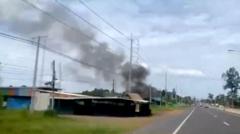In a troubling escalation of border violence, fighting erupted on Thursday at the Thailand-Cambodia border, resulting in significant casualties. At least 15 people, predominantly civilians, have died as clashes ensue, rekindling memories of deadly confrontations in the past. This latest conflict traces its roots to the recent fallout between Thai Prime Minister Paetongtarn Shinawatra and Cambodia's Prime Minister Hun Sen, sparked by a leaked phone conversation that has strained their longstanding familial ties.
Fractured Ties: Renewed Conflict Erupts at Thailand-Cambodia Border

Fractured Ties: Renewed Conflict Erupts at Thailand-Cambodia Border
Tensions rise again as border fighting ignites amidst deteriorating relations between Thailand and Cambodia following contentious political leaks.
The incident began after five Thai soldiers were injured in a landmine explosion, escalating into a broader confrontation. Historically, tensions have existed between the two nations, particularly over disputed territories and accusations of interference in each other's domestic affairs. The leaking of Shinawatra’s private remarks about Hun Sen has transformed a once cordial relationship into a fierce rivalry, culminating not only in military clashes but also in economic repercussions and diplomatic expulsions.
Following the fallout from the leaked call, where Shinawatra referred to Hun Sen as "uncle," public outrage ensued, leading to her suspension as prime minister. Meanwhile, Hun Sen's motivations for leaking the conversation remain unclear, though many speculate it was a strategic move to assert dominance following years of a more amicable relationship.
With both countries facing economic challenges, including the impacts of the pandemic and declining tourism, neither appears willing to back down from the conflict. Recent investigations into Cambodian business figures by Thai authorities signal an ongoing rivalry that could lead to further clashes. As regional actors grapple with the situation, the hope for resolution through ASEAN remains unclear, with both powerful leaders poised to leverage their nationalistic sentiments at the expense of diplomatic resolution.
In summary, the latest skirmishes at the Thailand-Cambodia border highlight a deeper, more complex rivalry driven by political machinations and personal betrayals, leaving both nations at a precarious crossroads as the potential for renewed violence looms large.
Following the fallout from the leaked call, where Shinawatra referred to Hun Sen as "uncle," public outrage ensued, leading to her suspension as prime minister. Meanwhile, Hun Sen's motivations for leaking the conversation remain unclear, though many speculate it was a strategic move to assert dominance following years of a more amicable relationship.
With both countries facing economic challenges, including the impacts of the pandemic and declining tourism, neither appears willing to back down from the conflict. Recent investigations into Cambodian business figures by Thai authorities signal an ongoing rivalry that could lead to further clashes. As regional actors grapple with the situation, the hope for resolution through ASEAN remains unclear, with both powerful leaders poised to leverage their nationalistic sentiments at the expense of diplomatic resolution.
In summary, the latest skirmishes at the Thailand-Cambodia border highlight a deeper, more complex rivalry driven by political machinations and personal betrayals, leaving both nations at a precarious crossroads as the potential for renewed violence looms large.


















